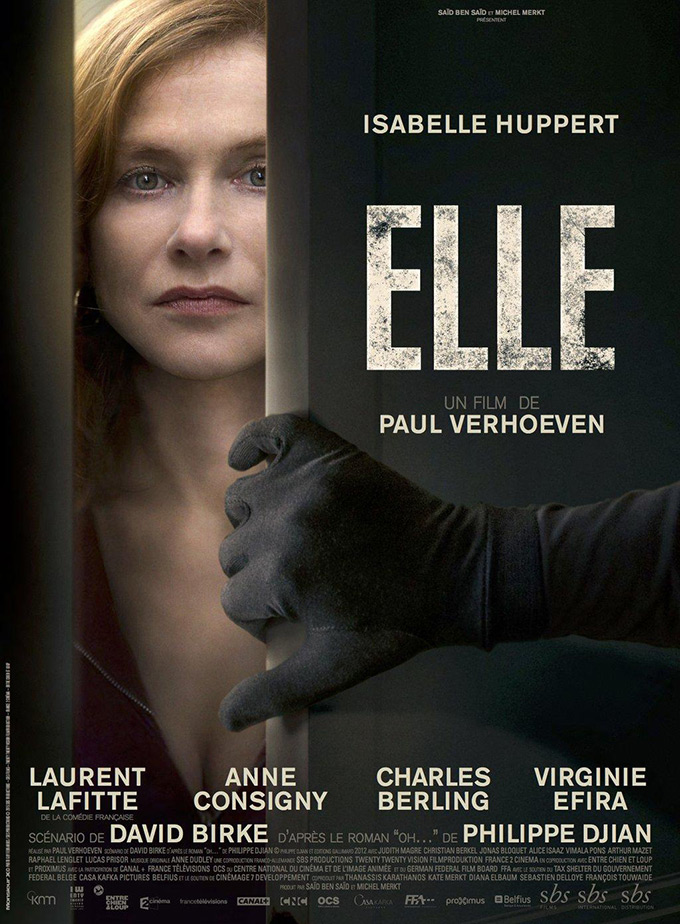Film Review | Paul Verhoeven’s Elle is a Jet-Black Exercise in Blindsiding the Audience
Paul Verhoeven is a rare filmmaker whose managed to successfully navigate the thin line between controversy and wide distribution, between art-house and ticket sales, and between absurdity and mainstream success. Finding fame first in his home country of Holland, with work like The Fourth Man, a dizzying exercise in surrealism and style – he later moved to the United States. In Hollywood, he pushed the boundaries of content produced in blockbuster cinema with the ultra-violent and subversive one-two punch of Robocop and Total Recall and the super sleazy double bill of Basic Instinct and Showgirls. Yet, even with this extreme body of work behind him Elle may be his utmost controversial work, but also his finest and most thought provoking.

The wonderful Isabelle Huppert (acclaimed recently for her work in Louder than Bombs and Things to Come) plays Michele Le Blanc, a business woman working in video game development. The film opens with her being raped by a masked intruder in her home. Unwilling to call the police due to being the daughter of France’s most notorious serial killer, she plots to uncover the culprit and get revenge.
From a plot synopsis like this, the viewer – without even seeing the film – has certain expectations, a result of having seen plenty of rape-revenge cinema (e.g. Kill Bill, Sudden Impact, Girl with The Dragon Tattoo). Yet, the brilliance of Elle is how it constantly subverts the genre conventions of these movies, consistently blindsiding its audience. An early example of this is Michele buying an incredibly baroque axe to protect herself. From the brief pause of her holding the instrument, fans of cinema and theatre aware of the Chekhov’s gun principle will think “a weapon introduced in the first act will be used in the third act”. Not in Elle – the axe never appears again.
Also, after Michele doesn’t report the rape, one thinks the film will become about her failing to speak up about the action – either out of fear, shame or trauma (a major part of BBC’s recent Apple Tree Yard, an interesting companion piece to Elle). Nope. Our protagonist blurts out what happened to her in a restaurant over dinner with friends twenty minutes in, to the absolute shock of her company.
Robbie Collin referred to Elle as a “comedy of manners about rape”. It’s an apt summation as Verhoeven and screenwriter David Birke, although taking the rape portion of the drama very seriously (the scenes where the act occurs are shockingly abrupt, uncomfortable and terrifying), seem to be poking fun at how the fallout of such a deed is typically portrayed in cinema. It could be so easy to portray Michele as a 2-D victim – someone angelic whose life was ruined by her experience. Yet, she’s the opposite. As an audience member, one does really root for Michele – partly due to Huppert’s winning charisma, partly because what happened to her is unthinkable and partly down to the razor-sharp wit she displays dealing with the people in her life. However, she’s also a pretty terrible person – she produces video-game content that treats women horrifically, she engages in an affair with her best friend’s husband, she actively tries to seduce her married neighbour (Laurent Lafitte).
[arve url=”https://www.youtube.com/watch?v=gM96ne-XiH0"]
Manchester by the Sea mined drama out of the minutiae of grief – taking time to show life continuing on in the aftermath of a tragic event. Elle does a similar thing. Just because something abhorrent happened to Michele, it doesn’t mean she can stop being a mother to her son Vincent (Jonas Bloquet), who is being cuckolded by his girlfriend Josie (Alice Issaz), or stop running her company. It also doesn’t mean that because she was raped, she must suddenly be this innocent virtuous victim. She can be a realistic layered person with other neuroses unrelated to her recent trauma. This is the warped thesis of Birke and Verhoeven who flesh it out brilliantly in the drama, while also neatly exploring in the video-game sub-plot how men have the tendency to derive pleasure from the degradation of women.
It will divide audiences, providing the fuel for many critical essays for years to come. What’s undeniable though is that Elle manages to be a very playful movie – there are so many funny lines in the conversations between Michele and her mother (Judith Magre) and her overly religious neighbour (Virginie Efra) – about the least playful topic ever. Although, what else could one expect from Verhoeven. Most of his career has been about shocking audiences. It’s something he does with the utmost skill.
Elle is in cinemas from March 10th.
Featured Image Credit

